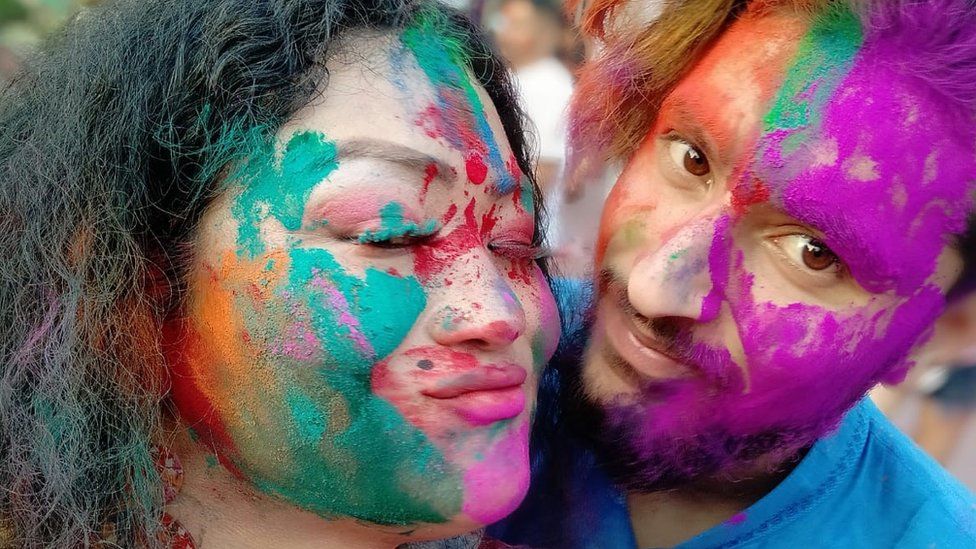Maya Gurung and Surendra Pandey were poised to create history.
Maya is a transgender woman but has not changed her gender on official documents. Her partner Surendra is a gay man.
They were to be Nepal’s first same-sex couple to legally get married, following an interim order from the country’s Supreme Court that directed the government to register such unions until it prepared legislation to change the law.
The couple had a temple wedding ceremony in 2017 but wanted their union to be legally recognised.
The order was hailed by progressives as a historic one that would bring relief to same-sex couples in the Himalayan nation.
But the couple’s dreams were not to be.
On 13 July, the district court in Nepal’s capital Kathmandu, refused to register their marriage, arguing that lower courts were not bound to follow the interim order as it was only directed at the government.
“We had many dreams, but they are now shattered,” Ms Gurung told the BBC. “It made us feel like we are not citizens of this country.”
The couple has lodged an appeal at a High Court in the city of Patan, but the hearing has been postponed five times already.
The district court’s refusal to register the marriage is being seen as a fresh setback to decades of progress Nepal has made to improve legal protections and social acceptance of sexual minorities.
Pinky Gurung, who leads LGBTQ rights group, Blue Diamond Society, says the community still has “a long fight” to achieve marriage equality.
“The court, especially the Supreme Court, is the only entity that has favoured us many times.”
Sunil Babu Pant, who was the country’s first openly gay MP, and the founder of Blue Diamond Society, has called the “lingering” process “unjust to the entire sexual and gender minority community”.
“We pushed Maya and Surendra’s case as a test. Once their marriage gets registered, all other aspiring couples will be able to register their marriage.”

The couple’s disappointment at the lower court ruling has been heightened by the trouble Mr Pandey and Ms Gurung went through to get their marriage registered.
Before they approached the court, they had to first travel to Mr Pandey’s village in Nawalparasi – about 150km (93 miles) from the capital – to get a recommendation letter from the local government.
The drive should have only taken four to five hours, but monsoon rains and accompanying landslides meant they spent 12 hours on the road. “We were sweating like pigs in the bus for at least four hours,” Ms Gurung says.
On returning to Kathmandu, the couple were told to get another letter from the ward office in their neighbourhood. Then, officials told them to bring a proof of residence letter, which had to be signed by their landlord and two other neighbours.
The court also ordered Ms Gurung – who had been married to a woman before – to provide documents proving her first marriage had been dissolved in 2013, which would allow her to marry again. “I have suffered a lot,” Ms Gurung says.
She says she knew at a very young age that she didn’t identify with her sex, but was worried it would bring shame on her family as her father was a village chief.
When she was 13, she moved to Kathmandu where she was able to live openly as a transgender woman.
But two years later, her family forced her to marry a woman. They went on to have two children. She says she suffered from depression because of the marriage and is not in touch with her children. In 2013, she filed for divorce.
That same year, Nepal issued a third gender in citizenship certificates following a landmark court ruling, six years earlier.

In 2015, Ms Gurung met Mr Pandey in Nawalparasi, close to where her sister owned a restaurant.
Mr Pandey had been always attracted to men – but he fell in love with Maya as soon as they met. He now says he is not sure how to categorise his sexual orientation.
The relationship gave him the courage to come out to his older sister, who raised him from the age of six, when their parents died of typhoid.
“Initially my sister did not accept it, she was worried and anxious about me and my future, but gradually she accepted the fact that I am different.”
Mr Pandey followed Ms Gurung to Kathmandu, and they gradually won the approval of their families.
After two years of dating, the couple held a wedding ceremony at a Hindu temple in Kathmandu, in 2017. Dozens of family members and friends attended. They danced and sang all night to the music of five traditional musical instruments called panche bajas.
Since then, they have been living together with their pet dog, Suru. “We clean our flat together, we cook together, I like Maya’s chicken recipe very much,” Mr Pandey says.
He says they are hopeful that their marriage will be registered and ready to bring the case to the Supreme Court again if necessary.
After their marriage is recognised, they want to open a joint bank account and share the ownership of the land they bought. But their biggest dream is to adopt a child, once their finances are more stable.
Just like other couples, they sometimes argue but say they make up quickly.
“We can’t afford to fight. We need to get along as we have a long life ahead,” says Mr Pandey.
Related Topics
- Same-sex marriage
- LGBT
- Nepal
